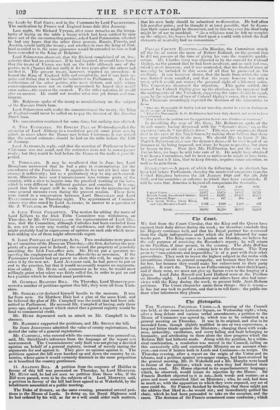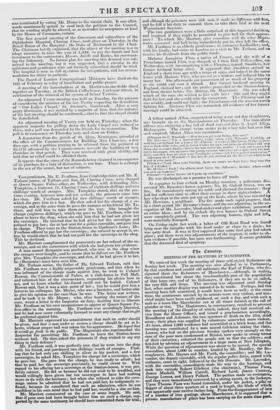Ebe airtrriptai#.
THE NATIONAL POLITICAL UNION.—A meeting of the Council was held, at the room in Leicester Square, on 'Wednesday night ; when, after a long debate and various verbal amendments, a petition to the House of Commons was agreed to, which was to -be submitted to a general meeting on Thursday. It was in its original, and also in its amended form, though slightly modified in one or two expressions a long and bitter tirade against the Ministers ; charging them with weak- ness, imbecility, vacillation, and every failine.• and fault belonging to humanity, and attributing to them alone the slow progress which the Reform Bill had hitherto made. Along with the petition, by a whim- sical combination, a resolution was moved in the Council, calling on this excessively silly and contemptible Ministry on no account what- ever—not even if beaten both in Lords and Commons—to resign. On Thursday evening, after a report on the origin of the Union and its labours, and a petition against newspaper stamps, had been received by the general meeting, Mr. D. Wakefield and a Mr. Murphy were heard in favour of the petition; which was, when they had finished their speeches, read. Mr. Hume objected to its unparliamentary language; which, he observed, would insure its rejection by the House. Sir Francis Burdett objected to it in tole—both words and matter—as a gross and most unmerited libel on Ministers; who, he said, had done as much as, with the opposition to which they were exposed, any set of men could do. Sir Francis finished by declaring, that those might put the address that liked it—he would not; and immediately quitted the chair, which he had been persuaded to take on the occasion, and the room. The decision of Sir Francis occasioned some confusion; which
was 'terminated by voting Hume to the vacant chair. It was after- wards unanimously agreed to send back the petition to the Council, that its wording might be altered, so as to render its acceptance at least by the House of Commons, certain.
The first general meeting of the Governors and subscribers of the Ophthalmic Hospital, Charing Cross, took place on Thursday, in the Board Room of the Hospital ; the Duke of Richmond in the Chair. The Chairman briefly explained, that the object of the meeting was to adopt measures to raise the sum of 1,5001. to pay the fourth and last instalment to the contractors, Messrs. Joliffe and Banks, for construct- ing the Infirmary. No formal plan for meeting this demand was sub- mitted to the meeting, but it was suggested, that a circular to the noblemen and gentlemen who :lad formerly subscribed should be tried. The hospital is now in full operation for out-patients, and has accom- modation for thirty in-patients.
The Board of London Congregational Ministers have fixed on the 16th of February as a day of humiliation and public prayer.
A meeting of the householders of St. Martin's-in-the-fields dined together on Tuesdays at the British Coffeehouse, Cockspur Street, in celebration of the removal of the system of Select Vestries.
An adjourned Vestry meeting was held on Tuesday, for the purpose of considering the minutes of the last Vestry respecting the demolition of " Our Lady's Chapel," St. Saviour's, Southwark. After a very angry discussion, it was carried by a majority of four, that the minutes of the last meeting should be confirmed,—that is, that the chapel should be demolished.
An adjourned meeting of Vestry was held on Thursday ; when the apparent majority for pulling down the Lady Chapel was reduced to three, and a poll was demanded by the friends for its restoration. The poll is to commence on Thursday next, and close on Friday.
A deputation from the parish of St. Mary, Newington, attended at the office of the Commissioners for Building New Churches, a few days ago, with a petition praying to be released from the payment of 16,517/. advanced by the Commissioners towards the building of new churches in that parish. They were received with great civility, and told that no relief could be afforded them.
It appears that the story of the Rotunda being cleansed in consequence of its purchase by a lady of distinction, is not true. There is a change in the sex of the orator, but not of subjects.



























 Previous page
Previous page